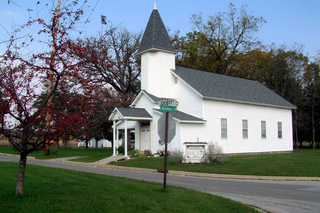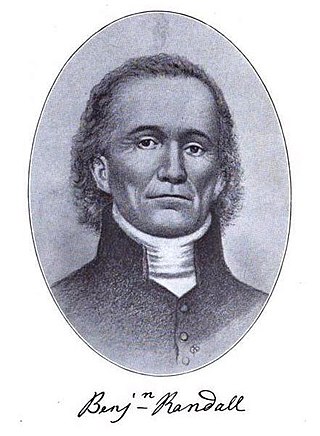
Arminianism is a movement of Protestantism initiated in the early 17th century, based on the theological ideas of the Dutch Reformed theologian Jacobus Arminius and his historic supporters known as Remonstrants. Dutch Arminianism was originally articulated in the Remonstrance (1610), a theological statement submitted to the States General of the Netherlands. This expressed an attempt to moderate the doctrines of Calvinism related to its interpretation of predestination.
Baptists form a major branch of Protestantism distinguished by baptizing only professing Christian believers, and doing so by complete immersion. Baptist churches also generally subscribe to the doctrines of soul competency, sola fide, sola scriptura and congregationalist church government. Baptists generally recognize two ordinances: baptism and communion.
The Holiness movement, also known as the Wesleyan–Holiness movement, is a Christian movement that emerged chiefly within 19th-century Methodism, and to a lesser extent influenced other traditions such as Quakerism, Anabaptism, and Restorationism. The movement is historically distinguished by its emphasis on the doctrine of a second work of grace, generally called entire sanctification or Christian perfection and by the belief that the Christian life should be free of sin. For the Holiness movement, "the term 'perfection' signifies completeness of Christian character; its freedom from all sin, and possession of all the graces of the Spirit, complete in kind." A number of evangelical Christian denominations, parachurch organizations, and movements emphasize those beliefs as central doctrine.

The Separate Baptists in Christ are a denomination of Separate Baptists found mostly in United States.
The Six-Principle Baptists is a Baptist Christian denomination in United States.
The Old Regular Baptist denomination is one of the oldest in Appalachia with roots in both the Regular and Separate Baptists of the American Colonies and the Particular Baptist of Great Britain. This group has seen a marked decline in its membership during the last two decades. Part of the decline may be attributable to orthodox biblical interpretations like a dress code where men must wear long pants, not shorts, and women must wear long dresses. Other such interpretations include women not being allowed to cut their hair or speak publicly on church business, although women can frequently shout while praising. Members who do not comply with the strict dress code and norms face being "churched", i.e., being kicked out of the congregation and possibly shunned. The Old Regular Baptist Faith and order with her many branches and factions still remains the dominant Faith in some rural Central Appalachian Counties along or near the Kentucky Virginia border. In most churches, the congregation maintains a collection of photographs of deceased members.
Regular Baptists are "a moderately Calvinistic Baptist denomination that is found chiefly in the southern U.S., represents the original English Baptists before the division into Particular and General Baptists, and observes closed communion and foot washing", according to Merriam Webster. This definition describes Old Regular Baptists, not those who formed as a result of the Fundamentalist-Modernist controversy.
The United American Free Will Baptist Church is the oldest national body of predominantly black Free Will Baptists in the United States.
The National Association of Free Will Baptists (NAFWB) is a national body of Free Will Baptist churches in the United States and Canada, organized on November 5, 1935 in Nashville, Tennessee. The Association traces its history in the United States through two different lines: one beginning in the South in 1727 and another in the North in 1780. The "Palmer line," however, never developed as a formal denomination. It consisted of only about three churches in North Carolina. The NAFWB is the largest of the Free Will Baptist denominations.
The General Association of General Baptists is a Baptist Christian denomination in the United States. It is affiliated with the National Association of Evangelicals and the Baptist World Alliance. The headquarters are located in Poplar Bluff, Missouri, where they operate Stinson Press.

United Baptist is name of several diverse Baptist groups of Christianity in the United States and Canada.
General Baptists are Baptists who hold the general or unlimited atonement view, the belief that Jesus Christ died for the entire world and not just for the chosen elect. General Baptists are theologically Arminian, which distinguishes them from Reformed Baptists.
The Church of God, Mountain Assembly (CGMA) is a holiness Pentecostal Christian body formed in 1907, with roots in the late 19th-century American holiness movement and early 20th-century Pentecostal revival. The denomination maintains headquarters in Jellico, Tennessee and is a member of the Pentecostal/Charismatic Churches of North America.

The International Pentecostal Holiness Church (IPHC) or simply Pentecostal Holiness Church (PHC) is an international Holiness-Pentecostal Christian denomination founded in 1911 with the merger of two older denominations. Historically centered in the Southeastern United States, particularly the Carolinas and Georgia, the Pentecostal Holiness Church now has an international presence. In 2000, the church reported a worldwide membership of over one million—over three million including affiliates.
The Independent Assemblies of God International (IAOGI) is a pentecostal Christian association with roots in a revival of the 1890s among the Scandinavian Baptist and Pietist communities in the United States. Independent Assemblies of God International is a member of the Pentecostal Charismatic Churches of North America. International offices are located in Laguna Hills, California.
The Wesleyan Church, also known as the Wesleyan Methodist Church and Wesleyan Holiness Church depending on the region, is a Methodist Christian denomination in the United States, Canada, the United Kingdom, South Africa, Namibia, Sierra Leone, Liberia, Indonesia, and Australia. The church is aligned with the Wesleyan-Holiness movement and has roots in the teachings of John Wesley. It adheres to Wesleyan-Arminian doctrine and is a member of the World Methodist Council.
The Congregational Christian Churches were a Protestant Christian denomination that operated in the U.S. from 1931 through 1957. On the latter date, most of its churches joined the Evangelical and Reformed Church in a merger to become the United Church of Christ. Others created the National Association of Congregational Christian Churches or joined the Conservative Congregational Christian Conference that formed earlier in 1945. During the forementioned period, its churches were organized nationally into a General Council, with parallel state conferences, sectional associations, and missionary instrumentalities. Congregations, however, retained their local autonomy and these groups were legally separate from the congregations.

Benjamin Randall was an American Baptist minister the main organizer of the Free Will Baptists in the northeastern United States.
Randall University is a Christian university in Moore, Oklahoma. Founded in 1917, it offers associate, bachelor's, and master's degrees. It is one of several higher learning institutions associated with the Free Will Baptists. Randall University is also a member of the Oklahoma Independent Colleges and University. In 2015, it had an enrollment of 365.







